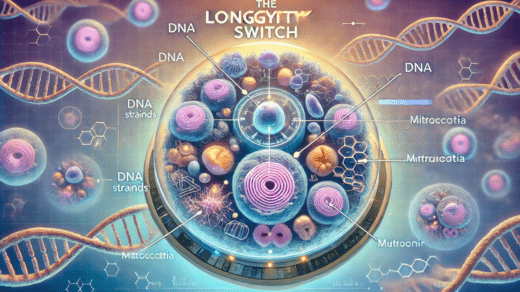In our quest for a longer, healthier life, scientists have uncovered fascinating insights into the aging process. Central to these discoveries is the concept of the “longevity switch,” a term that encapsulates the cellular mechanisms influencing lifespan. Understanding how our cells operate and age can provide valuable strategies to enhance longevity.
In this blog, we’ll explore the intricacies of the longevity switch, its implications for health, and perspectives to consider in the broader context of aging.
Key Takeaways
- The “longevity switch” refers to cellular mechanisms that regulate aging and lifespan.
- Key processes include genetic regulation, mitochondrial function, and protein homeostasis.
- Lifestyle factors such as diet, exercise, and stress management can influence these cellular mechanisms.
- Ongoing research aims to develop interventions that target these processes to promote healthy aging.
Overview
The longevity switch encompasses a complex network of cellular processes that dictate how our bodies age. By gaining a deeper understanding of these mechanisms and exploring ways to modulate them, we can develop targeted strategies to significantly extend health span—the portion of life spent in optimal health, vitality, and function.
Understanding the Longevity Switch
At the cellular level, aging is influenced by several key mechanisms:
- Genetic Regulation: Research suggests that aging may be driven by a programmed genetic switch, where certain pathways responsible for repair and maintenance are turned off over time, leading to functional decline. citeturn0search2
- Mitochondrial Function: Mitochondria, the powerhouses of the cell, play a crucial role in aging. Maintaining healthy mitochondrial function is essential for long-term health during the aging process. citeturn0search1
- Protein Homeostasis: The balance of protein synthesis and degradation is vital for cellular function. Disruptions in this balance can lead to the accumulation of damaged proteins, contributing to aging and age-related diseases.
Implications for Health and Longevity
Understanding these mechanisms opens avenues for interventions aimed at promoting healthy aging:
- Dietary Interventions: Caloric restriction and specific nutrient intakes have been shown to influence genetic pathways associated with longevity.
- Pharmacological Approaches: Compounds like rapamycin have been found to extend lifespan in various organisms by targeting pathways such as mTOR, which is involved in cell growth and metabolism. citeturn0search18
- Lifestyle Modifications: Engaging in regular physical activity, effectively managing stress, and ensuring adequate, high-quality sleep play crucial roles in maintaining overall health and longevity. These lifestyle factors contribute to optimal mitochondrial function, the powerhouse of our cells, by enhancing energy production, reducing oxidative stress, and promoting efficient cellular repair. Additionally, they support protein homeostasis—the delicate balance of protein synthesis, folding, and degradation—preventing the accumulation of damaged or misfolded proteins that can contribute to aging-related diseases. By integrating these habits into daily life, individuals can create a strong foundation for longevity, promoting not only a longer lifespan but also an extended healthspan characterized by vitality, resilience, and cognitive well-being.
Perspectives and Considerations
While the pursuit of an extended lifespan is undeniably compelling, it is equally important to consider the broader implications that come with increased longevity. Beyond simply adding years to life, we must examine the quality of those years, the potential societal and economic impacts, the ethical considerations of life extension technologies, and the sustainability of resources in a world where people live significantly longer.
A holistic approach to longevity must not only focus on delaying aging but also on ensuring that extended lifespans contribute to enhanced well-being, fulfillment, and a thriving, balanced society.
- Quality vs. Quantity of Life: Extending lifespan should not compromise the quality of life. Interventions should aim to enhance healthspan, ensuring that additional years are lived in good health.
- Ethical and Social Implications: Access to longevity interventions may raise ethical questions regarding equity and resource allocation.
- Individual Variability: Genetic and environmental factors mean that interventions may not have uniform effects across all individuals.
Conclusion
Understanding the longevity switch offers a promising avenue for enhancing health and extending lifespan. By focusing on cellular health through lifestyle choices and potential interventions, we can work towards a future where aging is not just about adding years to life but adding life to years. How will you activate your longevity switch today?
At Grow with Dr. Joanette, we are dedicated to helping you understand and activate your body’s longevity switch. Our personalized programs are designed to support your journey toward a longer, healthier life. Visit us at The BEJO Network, LLC, 172 Center St Ste 202, Jackson, WY 83001, or call us at 1-475-285-1751 to learn more.
FAQs
Q.What is the longevity switch?
A. The longevity switch refers to cellular mechanisms that regulate aging and lifespan, including genetic regulation, mitochondrial function, and protein homeostasis.
Q.How can I influence my longevity switch?
A. Lifestyle factors such as a balanced diet, regular exercise, stress management, and adequate sleep can positively affect the cellular processes associated with aging.
Q.Are there supplements that can activate the longevity switch?
A. Some compounds, like rapamycin, have shown promise in influencing pathways related to aging. However, it’s essential to consult with a healthcare professional before starting any supplementation.
Q.Is extending lifespan the same as extending health span?
A. Not necessarily. Lifespan refers to the total years lived, while health span refers to the period of life spent in good health. The goal is to extend health span to ensure quality of life during the additional years.
Q.What role does genetics play in the longevity switch?
A. Genetics play a significant role in determining how our cells age, but environmental factors and lifestyle choices also have substantial impacts.
Q.Can stress impact the longevity switch?
A.Yes, chronic stress can negatively affect cellular health by increasing inflammation and oxidative stress, which accelerate aging. Stress management techniques like meditation, deep breathing, and exercise can help support longevity.
Q.How does sleep affect longevity?
A.Quality sleep is essential for cellular repair and regeneration. Poor sleep can disrupt hormonal balance and increase the risk of age-related diseases. Aim for 7-9 hours of restorative sleep each night.
Q.What foods help activate the longevity switch?
A.A diet rich in antioxidants, healthy fats, and lean proteins can support cellular health. Foods like leafy greens, berries, nuts, fatty fish, and olive oil have been linked to longevity.
Q.Is fasting beneficial for the longevity switch?
A.Intermittent fasting and calorie restriction have been shown to activate longevity pathways like autophagy, a process that helps remove damaged cells and improve cellular function.
Q.Can exercise slow down aging?
A.Yes, regular physical activity enhances mitochondrial function, reduces inflammation, and promotes healthy gene expression, all of which contribute to a longer, healthier life.
Q.Are there medical treatments available to influence the longevity switch?
A.Research is ongoing, but some emerging therapies, such as NAD+ boosters and senolytics (drugs that target aging cells), show promise in enhancing longevity.
Q.How does hydration affect the longevity switch?
A.Proper hydration helps maintain cellular function, supports detoxification, and ensures optimal metabolic processes, all of which are vital for longevity.
Q.Can mental health impact aging?
A.Absolutely. Positive social connections, mental stimulation, and emotional well-being have been linked to increased lifespan and better overall health.
Q.Is it too late to activate my longevity switch if I’m older?
A.No, making healthier lifestyle choices at any age can positively impact cellular health and improve both lifespan and health span.
Q.How can I start making changes today?
A.Start with small, sustainable steps such as improving your diet, incorporating movement, managing stress, and prioritizing sleep. Seeking professional guidance from Grow with Dr. Joanette can also help tailor a longevity plan specific to your needs.




